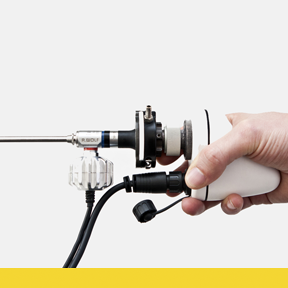1/1
Evotech, Endoscope and Business/Design Strategy
Evotech designs medical devices for the bottom of the pyramid. Its goal is to simplify medical technologies and devices, the majority of which are developed for use in Western hospitals—meaning the tools are expensive and often overdesigned and overengineered. This project reimagined the endoscope, a tube with a light and a camera that is used to look inside a patient’s body through an orifice (mouth, urethra, colon, etc.), making it relevant to and within reach of developing countries.
In US hospitals, these bulky, energy-sucking devices cost an average of $70,000—a price beyond the reach of most doctors in the developing world. Evotech and the design team redesigned the Low-Cost Portable Endoscope with off-the-shelf parts as a $250–$2,500 device powered by a laptop, making the endoscope smaller, portable, energy efficient, durable, waterproof and with the ability to manufacture at scale.
The challenge was to improve the device’s industrial design and develop a business model that would sustain it—and get the device to doctors whose patients would benefit from its use. With regard to the device’s design, the endoscope needed to enable doctors to make more precise diagnoses and to perform surgeries through a small incision, reducing patients’ risk of infection and recovery time. The endoscope also had to have the ability to be sterilized.
To make an excellent design solution, the Evotech experts discovered that one must search for a need. It was easy to find uses for an endoscope in mid- and high-income markets. But the search for endoscope users in low-income communities in the developing world was different: In these environments an endoscope is perceived as a luxury; endoscope use requires training that’s lacking; endoscopic procedures require a support infrastructure; endoscope use should be considered more broadly (beyond fistulas).
In a pilot study, Evotech distributed devices to Medicine for Humanity doctors with endoscopic training who were traveling to Uganda, where they used the prototype to successfully treat more than 20 women with vesicovaginal fistula. These types of cases previously were out of reach for surgical repair by Medicine for Humanity physicians. In India, local physicians used the device in more than 30 clinical evaluations and procedures.
Prototyping led to the final design. Evotech experts iterated and tested the endoscope handle and waterproof casing. In less than a month, and guided by doctors’ feedback, the team built 11 versions of the handle, designing a heat sink and enclosure for the device’s LED light source, which plugs into the USB port on a computer to power the device remotely.
Evotech designed the Low-Cost Portable Endoscope with a simple shell that can be machined from medical-grade ABS at small production scales, which is key. The same design can transition to injection molding in higher quantities.
发布于2019-11-29
设计奖项
美国IDEA工业设计奖
Gold/金奖
2013 年
颜色

